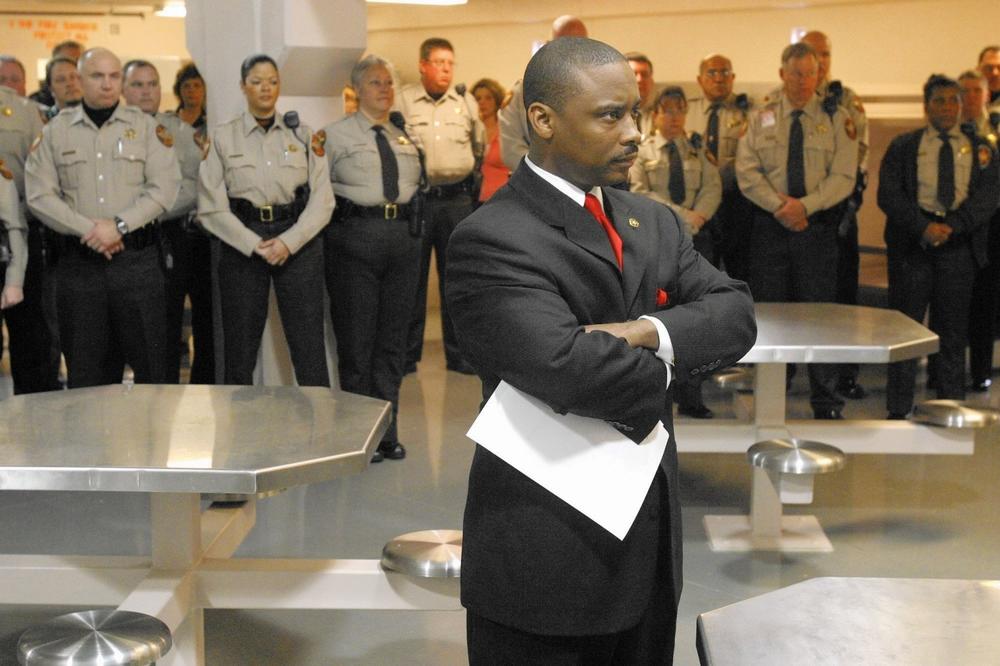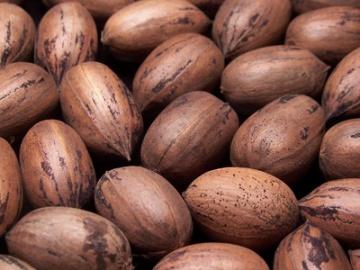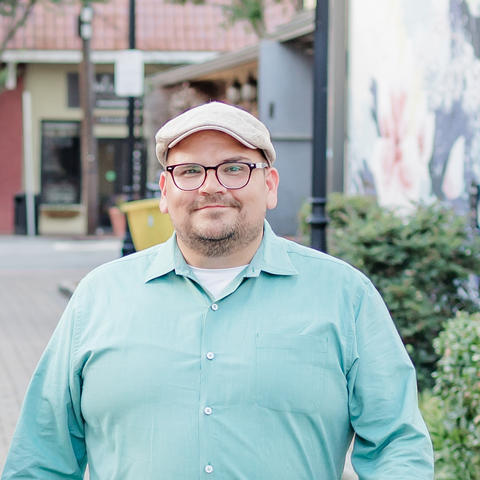
Section Branding
Header Content
Georgia Today: Clarence Thomas home in Savannah; scientists protecting pecans; GMO trees in Georgia
Primary Content
LISTEN: On the Friday, April 14 edition of Georgia Today: A megadonor purchased Clarence Thomas' mother's home in Savannah; climate researchers are working to protect pecans; and we visit a sapling forest of genetically modified trees in Georgia.

Peter Biello: Welcome to the Georgia Today podcast from GPB News. Today is Friday, April 14. I'm Peter Biello. On today's episode, an investigation finds a Republican megadonor purchased some Savannah real estate from Supreme Court Justice Clarence Thomas. Climate researchers are working to protect one of Georgia's top exports. And we'll take you on a trip to the first-of-its-kind forest featuring genetically modified trees. It's right here in Georgia. These stories and more are coming up on this edition of Georgia Today.
Story 1
Peter Biello: Supreme Court Justice and Georgia native Clarence Thomas did not disclose that a Republican megadonor purchased his mother's Savannah house in 2014. That's according to an investigation released yesterday by the nonprofit news organization ProPublica. Thomas was a co-owner of the House until 2014, when it was sold to a company created by conservative billionaire Harlan Crow. Crow had also paid for lavish vacations for Thomas and his wife over several years. That's according to another recent investigation by ProPublica. Property tax records reviewed by GPB show that Crow's company still owns the house and has made property tax payments on it. ProPublica spoke with several ethics law experts about the transaction, who said Thomas failure to disclose the deal violated federal law. Thomas did not respond to ProPublica's request for comment.
Story 2
Peter Biello: Xylazine is a tranquilizer used to treat animals. Now the Drug Enforcement Administration, or DEA, says it's making an already deadly drug, fentanyl, even more dangerous. And GPB's Ellen Eldridge reports use of Xylazine is growing quickly in Georgia.
Ellen Eldridge: Xylazine, also called Tranq, is being mixed with fentanyl, but it's not a narcotic, so naloxone won't reverse an overdose. The drug can also lengthen the time a person stays high. Bill Lynch is a pharmacist from the Northeast where Xylazine use was first reported. He spoke at a recent drug summit in Atlanta and says the drug is not a controlled substance, so it's not being tracked and first responders don't know what to look for.
Bill Lynch: They may be familiar with cardiogenic shock and how to treat it, how to reverse it, but they're not familiar with the Xylazine withdrawal syndrome. And if it's not properly managed, you're just have this repeat cycle because people want to go out and use again.
Ellen Eldridge: Long-term intravenous use of the drug can also cause wounds that require amputations. For GPB News, I'm Ellen Eldridge.

Story 3
Peter Biello: Convicted former Clayton County Sheriff Victor Hill has been ordered to report to an Arkansas prison next month to begin his 18-month sentence. Hill was convicted last year of violating the civil rights of detainees in the Clayton County jail. He's required to turn himself in to FCI Forrest City, which is described as a low-security facility with an adjacent minimum-security satellite camp. Hill's attorneys have asked the federal court to allow Hill to remain free on bond pending an appeal.
Story 4
Peter Biello: Gov. Brian Kemp has signed several bills, including one he says will make Georgia schools safer. GPB's Sarah Kallis has more.
Sarah Kallis: House Bill 147, also known as the Safe Schools Act, requires Georgia classrooms to conduct intruder alert drills and create a school safety plan. Schools are then required to report those actions to the Georgia Emergency Management Agency. Parents can opt out of the drills for their children. The bill also creates training for teachers to identify gang members in the classroom. When it passed, some Democrats question whether Republican colleagues move slowly on gun control measures aimed to prevent school shootings. Kemp also signed a bill to bolster literacy instruction in two bills aiming to help students with medical conditions. For GPB News, I'm Sarah Kallis.
Story 5
Peter Biello: The state of Georgia's net tax collections for March dropped by 3% compared to March of last year. That's a decrease of nearly $83 million. But year to date, tax collections are up about 5% year over year. In a statement, the office of Governor Brian Kemp says the drop is due in part to a decline of individual income tax collections by about a quarter. Increases in the sales and use tax, corporate income tax and motor fuel tax made up some of the difference.

Story 6
Peter Biello: In response to a changing climate. An international team of researchers, including four at the University of Georgia, are looking for ways to adapt to one of Georgia's top commodities: Pecans. GPB's Devon Zwald reports one practice they're looking at would actually change the look of the tree.
Devon Zwald: Climate issues for pecan growers face in the Southeast include drought, severe storms and rainfall and humidity that create conditions for disease called corn scab. That's according to Lenny Wells, professor of horticulture at UGA. His pecan research is looking at hedge pruning, a practice that creates a smaller, more compact tree. He says after Hurricane Irma in 2017, hedged trees had 60% less damage than non hedged trees.
Lenny Wells: Hedge pruning offers a way to to minimize that damage because you you don't have such a large tree out there that, when you have a big canopy on a tree like that, it presents a lot of sail that that can catch the wind and then blow those trees over.
Devon Zwald: He says the study is also looking at genetics and other management practices to make pecans more resilient. For GPB News, I'm Devon Zwald.
Story 7
Peter Biello: The Atlanta Braves are gearing up for the start of a three-game series against the Royals in Kansas City tonight. Meanwhile, the Tampa Bay Rays have pulled even with the record held by both the Braves and the Milwaukee Brewers. The Rays have started the season with 13 wins in a row, which the 1982 Atlanta Braves and 1987 Milwaukee Brewers have also done. This is a record if you don't count the teams pre-1900. The Saint Louis Maroons of the Union Association had a 20-game opening streak in 1884. The Rays could break the Braves' record tonight if they beat the Blue Jays in Toronto.
Story 8
Peter Biello: By now, you are probably used to the idea of some genetically engineered plants. You likely encounter them as fruits and vegetables. Increasingly, they are agricultural commodities like corn or soybeans. But up until now, there has never been a genetically engineered tree planted in a U.S. forest. As GPB's Grant Blankenship explains, that has changed. And those trees are for sale.
Grant Blankenship: It's a sunny, blustery day and Tattnall County about 70 miles west of Savannah. And I'm tromping through a small wetland that belongs to Vince Stanley.
Vince Stanley: Well, it may not have come out yet.
Grant Blankenship: We're looking for signs of new life. Is that one?
Vince Stanley: Yeah. Yeah.
Grant Blankenship: Right now, the trees, we're searching for it look more like sticks in the mud compared to the stand of Tupelo trees in deeper water. But Stanley is encouraged by dark green leaves.
Vince Stanley: Now that's impressive.
Grant Blankenship: Stanley says in a commercial forest, every acre has a plan. Uphill, where it's dry, the plan is growing and selling loblolly pines. But down here in this hardwood bottom?
Vince Stanley: We can't really manage this. We're just leaving this up to Mother Nature. So now with Living Carbon. We're going to Option B.
Grant Blankenship: Option B are these trees, All 10,500 of them, maybe the first of their kind outside of China. Living Carbon is the California-based company which says it engineered the genome of these saplings, which began as a hybrid of two European poplars. Stanley hopes they can turn this wetland into a grove of moneymakers for him and Living Carbon even during the years before he cuts the trees and sells them.
Vince Stanley: They're going to pay me a sum of money every year and I get to harvest the timber. Give me that. Give me that all day long.
Grant Blankenship: To understand what he's talking about, first let Living Carbon geneticist Jacob Hoyle explain what they did to the trees.
Jacob Hoyle: What we've done is slightly tuned down a couple of the native genes in our trees and add some neat some new ones.
Grant Blankenship: Like pumpkin genes. If you've seen the New Mexico desert, you've seen a creosote bush. A little of it is in there too. Plus genes from a shrub native to the South Pacific island of New Caledonia.
Jacob Hoyle: They're working together just only and exclusively to make that photosynthesis process more efficient.
Grant Blankenship: None of this has been peer reviewed, but what Living Carbon claims is that with tweaked photosynthesis, helping the trees be better at making their own food from sunlight, the trees will grow much faster than unmodified trees, which means Vince Stanley might harvest and sell these hardwoods in his lifetime.
Vince Stanley: You know, we call this a generational cut. Whenever you cut bottomlands, it takes 50 years before they can really come back. We're having to cut that in half.
Grant Blankenship: Living Carbon says they've doubled the growth rate of the trees. But Stanley says what may be even more exciting is what the company says about how much carbon this new forest can store.
Vince Stanley: The way that this land has been treated the last 1,000 years is offsetting — this bottomland is offsetting this, or sequestering this much carbon.
Grant Blankenship: That baseline rate of carbon capture is what Stanley wants to break to crack the carbon credit market. The carbon credit market is where companies or anyone really who puts climate-warming carbon in the atmosphere can pay cash for the carbon someone else — someone like Vince Stanley — has locked up in a tree. Hypothetically, some part of your carbon pollution gets zeroed out. The other party definitely leaves with cash in pocket. How much cash is uncertain. Stanley knows there have been real doubts about how the market appraises the carbon value of forests in recent years.
Vince Stanley: One of the professionals I went to still said, "Hey, look, this is the wild, wild West."
Grant Blankenship: But some things are clear.
Vince Stanley: So what we're finding is, is that the carbon credit market does not want to reward you for just doing the same thing over.
Grant Blankenship: Whatever the carbon baseline of your forest might be, the market wants it to lock up more.
Vince Stanley: So if I'm able to improve my baseline and sequester more carbon, then I get credits for it.
Grant Blankenship: Living Carbon promises a 27% leap above carbon sequester baseline with their new trees. The new credits are what they and Stanley hope to sell. If this has your head spinning or if you're surprised it's happening at all, Scott Merkle says you're not alone. Merkle is a professor of forest biology at the University of Georgia's Warnell School of Forestry. He says for years he's assured people there are no unregulated transgenic trees in U.S. forests.
Scott Merkle: Here we go with these hybrid poplars, and they're already out there. And I don't think hardly anyone knows about this.
Grant Blankenship: None of the scientists I talked to you for this story were aware of Living Carbon trees. Others, like Merkle, thought American chestnuts genetically engineered to resist the fungus that almost wiped them out over a century ago would have been the first. But they aren't. Why? Merkle says, for one thing, the ethics of conservation Forestry poses different questions than plantation forestry.
Scott Merkle: Do we want to put genetically engineered trees into the environment? And is it safe to do that?
Grant Blankenship: Will they crowd out native trees? How will they affect the experience of what people even call a forest? Merkle says normally an arm of the U.S. Department of Agriculture asks these questions.
Scott Merkle: The USDA Animal and Plant Health Inspection Service.
Grant Blankenship: Called APHIS for short.
Scott Merkle: You have to submit regular reports to them and they come in and inspect your plantings and it's all — nothing. — nothing escapes into the environment. That's the whole point.
Grant Blankenship: Surely, thought Merkle, APHIS is regulating the Living Carbon poplars.
Scott Merkle: But it turns out I thought wrong.
Grant Blankenship: According to the USDA, when Living Carbon submitted their genetically engineered trees for APHIS review in June of 2020, their methods didn't flagged them for regulation. But in August of 2020, just two months later, APHIS guidelines became more stringent. Had Living Carbon submitted then they could have been asked to prove their trees were, as Scott Merkle puts it, unlikely to escape and become a plant pest. Living Carbon geneticist Gary Moore says, don't worry, they thought of that.
Jacob Hoyle: We've kind of circumvented that concern by utilizing trees that are clonally propagated, that are female in nature and that have low fertility.
Grant Blankenship: Or says since the female clones produce no pollen, there will be no pollination and no seeds. Scott Merkle has doubts.
Scott Merkle: Yeah, the fact that it's a female clone also doesn't mean that it won't be produced by seeds either unless it's sterile. It just means that all of those particular trees that grow up from that clone have female flowers on them.
Grant Blankenship: He says the pollen those flowers need could already be out there. One of the parent trees of the Living Carbon tree, the European white poplar, has already escaped and is living on its own in parts of Georgia. It's considered an invasive species in South Carolina. Merkle says the new trees could seed with these invasive trees' help.
Scott Merkle: Theoretically, I don't really know if it would happen or not.
Grant Blankenship: Merkel wonders, too, if the genetically modified trees will grow as well in South Georgia as they did in the lab. Back in the hardwood bottom Tattnall County, Vince Stanley is thinking about these issues.
Vince Stanley: So, I mean, that's another reason we're starting our footprint a little bit small right here. I'll just say, like the old timers, you can handle the snake if you're — you know you're reaching down to grab a snake. We're not saying that's what this is, but we're looking at this and saying, hey, look, we're going to have to be able to control this product or is there anything to control?
Grant Blankenship: And if he learns something that makes him nervous?
Vince Stanley: We can go and cut every one of them down if we need to tomorrow.
Grant Blankenship: Most of the forests in the South are privately owned and many owners are looking to make a profit. That makes the South the logical market for Living Carbon, who've set up an office in Charleston, S.C., where they're actively recruiting foresters and landowners to grow their genetically modified trees. For GPB News, I'm Grant Blankenship in Tattnall County.
Peter Biello: One last thing before we head out for the weekend: Did you hear that line in Grant's story about handling a snake? Let me play that for you again if you missed it.
Vince Stanley: I'll just say, like the old timers, you can handle the snake if you're — if you know, you're reaching down to grab a snake.
Peter Biello: "You can handle the snake if you know you're reaching down to grab a snake." I am a big fan of phrases like that one. I will say that one was a new one for me. I absolutely loved it. In fact, I googled it because I wanted to learn a little more about the origins of it. But all Google sent back to me were pictures of people handling snakes and instructions on how to handle a snake without getting bitten, which is not something I will even attempt this weekend, but I might attempt to use that phrase.
Anyway, if you know anything about that phrase, send it to us along with your feedback on this program. The email address is GeorgiaToday@GPB.org. In fact, because I love these expressions so much, if you've got one your family uses or used to use, whether it's off-color or not, send it to us by email — again, GeorgiaToday@GPB.org. I am a Yankee, so if you send me one unique to the American South, I promise you I will use it in an attempt to blend in. If you like this podcast, please leave a review. It'll help other people find us. I'm Peter Biello. Thanks again for listening and have a great weekend.
___
GPB's Georgia Today newsletter hits your inbox on Tuesdays, Wednesdays and Thursdays with top stories from around the state featuring news, politics and more. Subscribe here.



